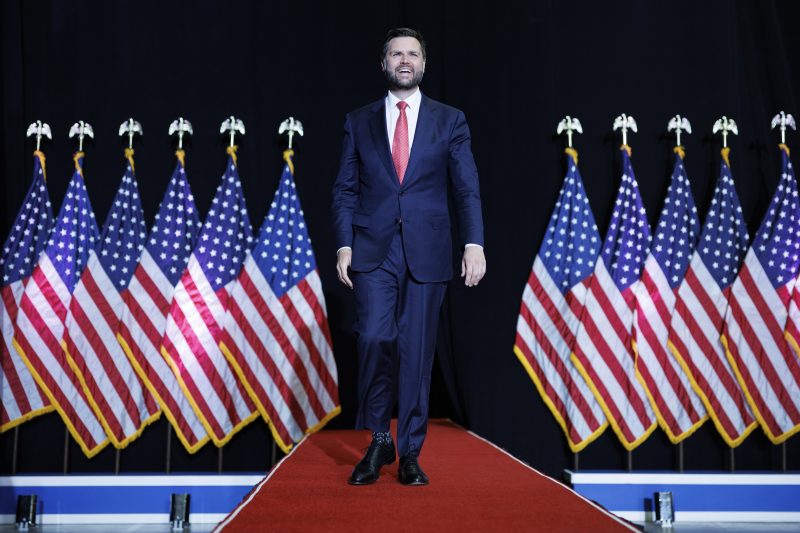
Nine days ago, Donald Trump picked a running mate in Sen. J.D. Vance (R-Ohio) that projected confidence about the race ahead. Trump seemed to be choosing a desire to guide his party in a more MAGA direction over expanding his base to improve his chances in the 2024 election.
The flip side of that, as I noted at the time, was risk. Vance didn’t pack the same base-expanding potential as other candidates (such as Sen. Tim Scott, Sen. Marco Rubio and North Dakota Gov. Doug Burgum). And Vance’s only campaign — for Senate in 2022 — was nothing to write home about. Despite winning, he polled as unpopular and performed significantly worse than any other statewide Ohio GOP candidate.
A week after Vance’s big introduction at the Republican National Convention, that risk looms large.
At least five quality polls out this week have gauged Vance’s image, and each shows that more people dislike him than like him. They show he is between two and nine points underwater.
As CNN’s Harry Enten noted Tuesday, that appears to be without recent precedent. Vice-presidential picks usually get a honeymoon period, and none has been in such negative territory so soon after their debut on the biggest stage.
But how much does that mean at this early juncture?
Let’s first dive into the numbers, from the CNN, NPR-PBS-Marist College, Reuters-Ipsos, Quinnipiac University and Economist-YouGov polls:
- Vance’s best numbers are in the Marist poll (31 percent favorable versus 33 percent unfavorable). But in every other poll, he’s between six and nine points underwater.
- Vance appears to struggle with independent voters. In four of the five polls, his unfavorable rating with them is double digits higher than his favorable rating. (The fifth poll shows him eight points underwater.)
- He doesn’t appear to have improved his image in recent days. The Reuters-Ipsos poll showed him going from six points negative last week to seven points negative today. CNN showed him going from seven points negative last month to six points negative now. In both cases, many more voters have rendered judgments on him than before, but those reviews haven’t been positive.
We are, of course, in unusual times. Vance’s introduction was overshadowed by the assassination attempt on Trump just two days before. It has also come amid plenty of focus on the Democratic side — and particularly whether President Biden would end his campaign, as he ultimately did Sunday. Perhaps Vance didn’t really have the chance to win people’s attention (and approval).
He also enters the stage at a time when voters are particularly sour on national politics. It’s rare to see any politician be popular; Trump, Biden and Vice President Harris are all also viewed more negatively than positively.
But generally speaking, VP picks are different — and more popular than the people who pick them. Hillary Clinton was double digits underwater for most of the 2016 campaign, but Sen. Tim Kaine (D-Va.) was pretty popular soon after Clinton selected him as her running mate. Biden had middling numbers in 2020, but Harris’s unpopularity from her 2020 presidential primary campaign soon reversed.
And Trump’s previous running mate, Mike Pence, was generally popular despite Trump’s being as much as 20 or 30 points underwater down the home stretch of the 2020 campaign.
It did take some time for Pence and Harris to improve their images — it didn’t happen immediately after the conventions — but voters were at least initially evenly split on them.
And, notably, Vance’s numbers are also worse than those for most of the big names being floated as potential running mates for Harris. Both Reuters-Ipsos and Economist-YouGov also tested such names as Pennsylvania Gov. Josh Shapiro, Michigan Gov. Gretchen Whitmer, Sen. Mark Kelly (Ariz.) and Transportation Secretary Pete Buttigieg. In each case, about as many Americans liked them as disliked them.
So it’s evident that Vance has some work to do and that his introduction hasn’t exactly gone swimmingly.
That doesn’t mean this is a major liability for Trump; Vance isn’t so unpopular that he would seem to be a reason for Trump-inclined voters to abandon Trump. The top of the ticket is what matters to the vast majority of voters, even as Trump’s running mate could matter somewhat more, given that Trump is 78.
But it does point to what may be a missed opportunity — the opportunity to put forward a running mate who appeals to voters who might be skeptical of Trump or gives them something Trump doesn’t.
That mattered less under the previous setup, when Trump appeared to be a pretty strong favorite to defeat Biden. If Harris can make the race more competitive and Vance’s numbers don’t improve — both big ifs — you can bet that more than a few people will begin to question the wisdom of a decision that seemed dicey even at the time.

